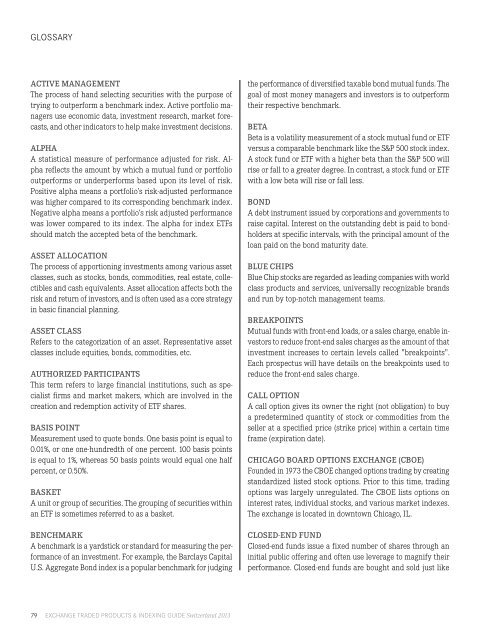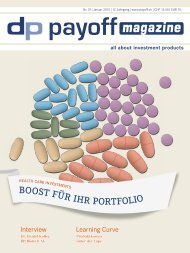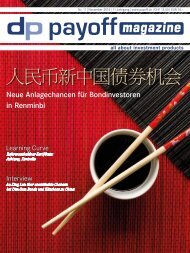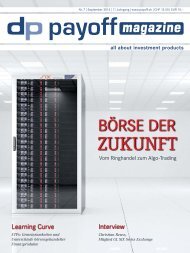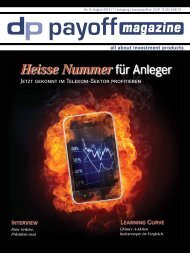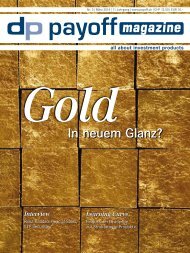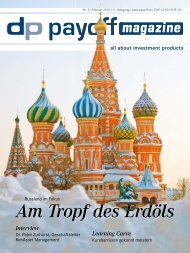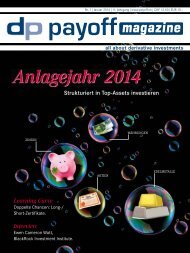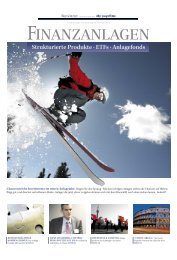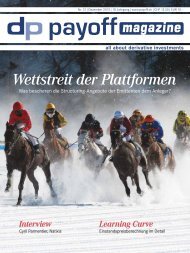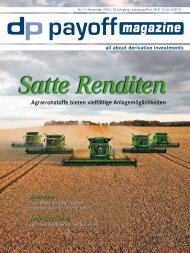You also want an ePaper? Increase the reach of your titles
YUMPU automatically turns print PDFs into web optimized ePapers that Google loves.
glossarY<br />
ACTIVE MANAGEMENT<br />
The process of hand selecting securities with the purpose of<br />
trying to outperform a benchmark index. Active portfolio managers<br />
use economic data, investment research, market forecasts,<br />
and other indicators to help make investment decisions.<br />
ALPHA<br />
A statistical measure of performance adjusted for risk. Alpha<br />
reflects the amount by which a mutual fund or portfolio<br />
outperforms or underperforms based upon its level of risk.<br />
Positive alpha means a portfolio’s risk-adjusted performance<br />
was higher compared to its corresponding benchmark index.<br />
Negative alpha means a portfolio’s risk adjusted performance<br />
was lower compared to its index. The alpha for index ETFs<br />
should match the accepted beta of the benchmark.<br />
ASSET ALLOCATION<br />
The process of apportioning investments among various asset<br />
classes, such as stocks, bonds, commodities, real estate, collectibles<br />
and cash equivalents. Asset allocation affects both the<br />
risk and return of investors, and is often used as a core strategy<br />
in basic financial planning.<br />
ASSET CLASS<br />
Refers to the categorization of an asset. Representative asset<br />
classes include equities, bonds, commodities, etc.<br />
AUTHORIZED PARTICIPANTS<br />
This term refers to large financial institutions, such as specialist<br />
firms and market makers, which are involved in the<br />
creation and redemption activity of ETF shares.<br />
BASIS POINT<br />
Measurement used to quote bonds. One basis point is equal to<br />
0.01%, or one one-hundredth of one percent. 100 basis points<br />
is equal to 1%, whereas 50 basis points would equal one half<br />
percent, or 0.50%.<br />
BASKET<br />
A unit or group of securities. The grouping of securities within<br />
an ETF is sometimes referred to as a basket.<br />
BENCHMARK<br />
A benchmark is a yardstick or standard for measuring the performance<br />
of an investment. For example, the Barclays Capital<br />
U.S. Aggregate Bond index is a popular benchmark for judging<br />
79 ExchangE TradEd ProducTs & IndExIng guIdE <strong>Switzerland</strong> <strong>2013</strong><br />
the performance of diversified taxable bond mutual funds. The<br />
goal of most money managers and investors is to outperform<br />
their respective benchmark.<br />
BETA<br />
Beta is a volatility measurement of a stock mutual fund or ETF<br />
versus a comparable benchmark like the S&P 500 stock index.<br />
A stock fund or ETF with a higher beta than the S&P 500 will<br />
rise or fall to a greater degree. In contrast, a stock fund or ETF<br />
with a low beta will rise or fall less.<br />
BOND<br />
A debt instrument issued by corporations and governments to<br />
raise capital. Interest on the outstanding debt is paid to bondholders<br />
at specific intervals, with the principal amount of the<br />
loan paid on the bond maturity date.<br />
BLUE CHIPS<br />
Blue Chip stocks are regarded as leading companies with world<br />
class products and services, universally recognizable brands<br />
and run by top-notch management teams.<br />
BREAKPOINTS<br />
Mutual funds with front-end loads, or a sales charge, enable investors<br />
to reduce front-end sales charges as the amount of that<br />
investment increases to certain levels called "breakpoints".<br />
Each prospectus will have details on the breakpoints used to<br />
reduce the front-end sales charge.<br />
CALL OPTION<br />
A call option gives its owner the right (not obligation) to buy<br />
a predetermined quantity of stock or commodities from the<br />
seller at a specified price (strike price) within a certain time<br />
frame (expiration date).<br />
CHICAGO BOARD OPTIONS EXCHANGE (CBOE)<br />
Founded in 1973 the CBOE changed options trading by creating<br />
standardized listed stock options. Prior to this time, trading<br />
options was largely unregulated. The CBOE lists options on<br />
interest rates, individual stocks, and various market indexes.<br />
The exchange is located in downtown Chicago, IL.<br />
CLOSED-END FUND<br />
Closed-end funds issue a fixed number of shares through an<br />
initial public offering and often use leverage to magnify their<br />
performance. Closed-end funds are bought and sold just like


